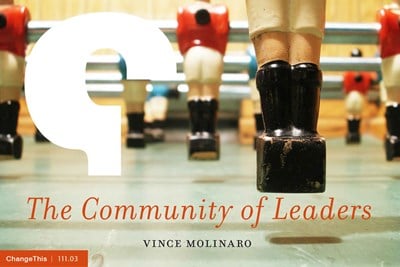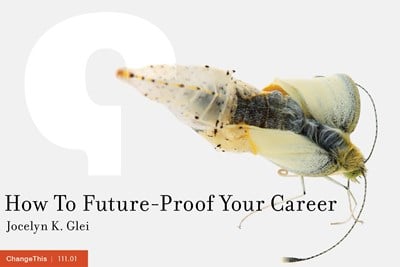
ChangeThis
ChangeThis is our weekly series of essays from today's thought leaders that are meant to evoke conversation by bringing forth new and unique ideas.
ChangeThis
-

Blog / ChangeThis
What? Your Organization Doesn't Have a Constitution?
By S Chris Edmonds
"Most senior leaders put greater thought into their organization's products than they do its culture. Yet culture drives everything that happens in an organization each day, including what leaders pay attention to, whether problems are ignored or resolved, and how employees and customers are treated. Of course, understanding the need for an effective culture is one thing. Creating and managing that culture is another. How does one go about creating something that, on one hand, is so important, but, on the other hand, seems so amorphous? Through the creation of an organizational constitution."
Categories: changethis
-

Blog / ChangeThis
Customer Experience, Big Data, and Competitive Advantage
By Larry Freed
"To compete and win in today's ultracompetitive environment, where consumers are in control and switching costs are very low, the customer experience is more important than ever before. Businesses cannot stand still; they must continue to push the envelope and evolve—not only products, services, and marketing, but also analytics. [...] Companies with insightful and actionable analytics can respond to the market and their customers quicker than their competitors. Tomorrow's winners will be defined by the innovative strength of the customer experience analytics they use and implement. The key to measuring this new world of customer experience analytics is to understand the rise of big data. In 2000, only one-quarter of all the stored information in the world was digital; paper, film, and other analog media ruled. No more. With the amount of digital data doubling every three years, as of 2013 less than 2 percent of all stored information is nondigital."
Categories: changethis
-

Blog / ChangeThis
Business in Blue Jeans: A Manifesto on How to Have a Successful Business on Your Own Terms, in Your Own Style
By Susan Baroncini-Moe
"Comparing yourself to other people is always a losing game, because there'll always be someone who's more successful than you are. There'll always be someone who does something better than you do. Where you stand relative to other people isn't nearly as important as where you stand relative to where you could be standing if you realized your full potential."
Categories: changethis
-

Blog / ChangeThis
DON'T QUIT YOUR JOB. FIRE YOUR BOSS. (An Invitation to Unravel What the World Has Taught You About Your Work, Your Career and Your Future)
By Aaron McHugh
"Do you have what it takes to make a difference in your nine-to-five job. What if you could restructure your work to do what you love. And, what if it all starts with firing your boss. Don't Quit Your Job. Fire Your Boss is a manifesto, a change in trajectory for your future. You own the opportunity to be the best at what you're already doing. Asking permission to pursue your dreams and do meaningful work doesn't start with hitting the eject button. Maybe it starts with staying right where you are, but there's a catch: your boss, well, you need to fire him. Blogger, writer, and career liberator Aaron McHugh shares from his own experience what it took to fire his boss. Creativity, inspiration, and fulfillment mixed with struggle and uncertainty form this type of journey. Only the brave are willing to make this disruptive shift in their career. Yet for every convert there is a guarantee of the most fulfilling, challenging, and liberating work you've always wanted. Make the change. Read this book, and then go fire your boss.
Categories: changethis
-

Blog / ChangeThis
The HUMAN Brand: How We Relate to People, Products and Companies
By Chris Malone
"Social psychologists have determined that primitive humans, in their struggle for existence, developed the ability to judge other people almost instantly along two categories of perception, which are known as warmth and competence. In fact, all humans have a primal, unconscious ability to make these two crucial judgments with a high degree of speed and accuracy: What are the intentions of this person toward me. And how capable are they of carrying out those intentions. [. . . ] We apply these warmth and competence judgments in all our relationships, including those involving commercial transactions. Companies and brands have the same capacity to stir up these hard-wired primal passions as people do, and we engage with them on the same basis. We experience feelings of affection and admiration for companies and brands that treat us well, and we feel insult or even rage when we believe that one of those companies has given us poor service or cheated us. [. . . ] Unfortunately, our studies show that most companies and brands fall well short of customer expectations on both warmth and competence.
Categories: changethis
-

Blog / ChangeThis
The Community of Leaders
By Vince Molinaro
"Leaders today are yearning for something more meaningful. The reason is for many of us, the experience of leadership has been mediocre at best. … Whatever the experience, you may end up questioning why you ever became a leader in the first place. You also know deep down that there has to be a better way. I'm here to tell you that there is."
Categories: changethis
-

Blog / ChangeThis
What Ethical Leaders Believe: The Leading in Context Manifesto
By Linda Fisher Thornton
"Aristotle said 'We are what we repeatedly do.' He was right. Our daily choices define us. They show just how far beyond ourselves we're thinking, how broadly we imagine our constituents, and how we see ourselves in the world. As we navigate the turbulence of today's workplace, there is power in asking ourselves, 'What is it that I repeatedly do?' [...] We would like to think that we are making the most responsible choices that we can under the circumstances. But then, in a typical challenging, chaotic day, what really determines what we do?"
Categories: changethis
-

Blog / ChangeThis
What is Customer Service?
By Steve Curtin
"Too often, customer service is viewed as a department, a designated employee's job role, or someone else's responsibility. Because of this limited view of customer service, many employees are content to simply execute a series of mandatory job functions until the end of their shifts—blissfully unaware of the myriad opportunities forfeited to make lasting positive impressions on their customers. To expand on this narrow definition of customer service, I'd like to submit my own definition for consideration: Customer service is a voluntary act that demonstrates a genuine desire to satisfy, if not delight, a customer."
Categories: changethis
-

Blog / ChangeThis
How To Future-Proof Your Career
By Jocelyn K. Glei
"The first co-working space was opened in San Francisco in 2005. Today, there are over 2500 co-working spaces in existence around the world. Cellphones first began to be used by the general population in 2000. Now, roughly 85% of the world has access to a mobile phone. Facebook was founded less than 10 years ago. Today, 1.25 billion people use the service. (That's 1 out of every 7 people on planet Earth.) Today, the way we interact with people, the tools we use, and the way we work are all changing at an incredibly rapid pace. This has huge implications for the way we run our careers. In fact, it demands that we utterly reinvent our approach, shifting from a focus on past accomplishments—the 'resum model'—to constant self-iteration, or what I think of as the 'learner's model.' To move to this model, we must adopt a new set of career rules. A set of rules that are, quite literally, made to broken."
Categories: changethis
-

Blog / ChangeThis
Rewriting The Myths of Creativity
By David Burkus
"There is a mythology that surrounds creativity. Cultures develop myths when they can't rely on existing knowledge to explain the world around them. They are developed and passed down in an effort to explain why certain mysterious events occur, or to affirm how we should behave and think. Creativity is no different. These myths were prevalent almost everywhere I looked—everywhere except in the most innovative companies and people. If we want to be more creative, if we want our organizations to be more innovative, then we have to learn from these companies and individuals, use the wealth of empirical research at hand, and rewrite the myths of creativity."
Categories: changethis
The original idea behind ChangeThis came from Seth Godin, and was built in the summer of 2004 by Amit Gupta, Catherine Hickey, Noah Weiss, Phoebe Espiritu, and Michelle Sriwongtong. In the summer of 2005, ChangeThis was turned over to 800-CEO-READ. In addition to selling and writing about books, they kept ChangeThis up and running as a standalone website for 14 years. In 2019, 800-CEO-READ became Porchlight, and we pulled ChangeThis together with the rest of our editorial content under the website you see now. We remain committed to the high-design quality and independent spirit of the original team that brought ChangeThis into the world.

